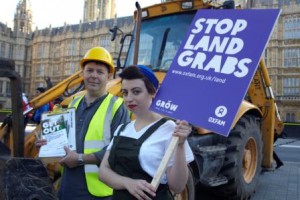Bulldozers at Parliament as Manchester man joins fight against the great land grab
Article published: Thursday, October 4th 2012
Bankers and multinational firms are seizing tracts of land the size of Greater Manchester from African farmers every five days, campaigners from Oxfam have warned.
 The development charity reckons millions of farmers and their families are being driven off their land in often shady deals. Campaigners are calling on the World Bank to freeze their agricultural investments for six months to buy some time for local communities trying to protect themselves.
The development charity reckons millions of farmers and their families are being driven off their land in often shady deals. Campaigners are calling on the World Bank to freeze their agricultural investments for six months to buy some time for local communities trying to protect themselves.
Altrincham activist David Llewellyn joined other protestors in parking bulldozers outside Westminster for the global launch of Oxfam’s campaign for protections which they hope will clamp down on the practice.
Llewellyn said the “out of control” land rush meant that “people who are trying to grow food and feed their families are suffering hunger, violence and greater poverty. We must take action now- investments can be positive, but they need to be regulated to prevent abuse”.
Land grabs by huge foreign agribusiness firms have shot up since 2008, attracted by volatile world food prices caused in part by what observers including Goldman Sachs analyst and Manchester economic advisor Jim O’Neill have identified as a market bubble driven by financial speculation.
Oxfam’s new report, Our Land, Our Lives, warns that 60 per cent of foreign investments in agricultural land in the global South over the last decade were in countries which face severe hunger problems.
In a process that sounds all too familiar the report details how people are fleeced of their assets in major fire sales to investors. Many locals are forced to leave their homes to find work in the cities, and the often high-quality land is then used to grow crops or biofuels for export.
A recent United Nations Trade and Development report noted that investors captured most of the gains from the practice, saying “it is hard to see how alleged benefits, for example in terms of employment generation or improved food security, would materialise, as most of this investment relates to crops for export which involve highly mechanized farming.”
The World Bank denies that its investments facilitate land grabs, and claims a six month moratorium “would likely deter responsible investors willing to apply our high standards.”
Llewellyn however said, “The World Bank can help stop these human rights abuses and ensure that investments help not harm poor communities. Investment should be good news for developing countries – not lead to greater poverty, hunger and hardship. And the UK Government needs to put pressure on it too.
“After the Oxfam protest in London I am going to take the campaign to the people of Greater Manchester and work with them to put pressure on UK Government- if we make our voices heard, we can support farmers in poor countries to have enough land to grow their food- and that everyone has enough to eat”.
Richard Goulding
More: News
Comments
No comments found
The comments are closed.



